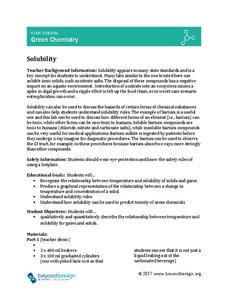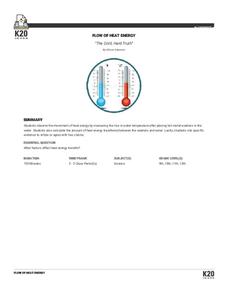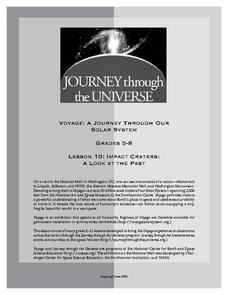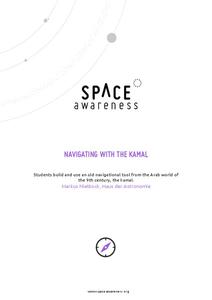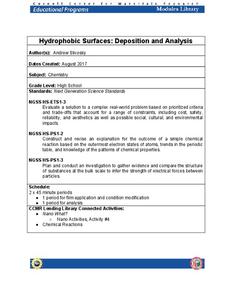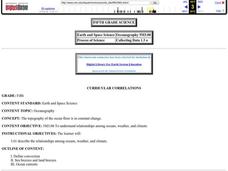Beyond Benign
Solubility
Enhance your class' ability to understand solubility. Science scholars examine how temperature and concentration affect solubility using an interesting lab experiment. The introduction and procedure also discuss the relationship between...
K20 LEARN
Microbes and Manure = Biofuel
Waste not, want not! Science scholars explore manure as an alternative energy source through reading and experimentation. Groups construct their own biofuel digesters and observe the process of methane production. The teacher's guide...
K20 LEARN
The Cold, Hard Truth
Things are really getting heated in the lab! Science scholars scope out the facts about heat energy transfer using a simple lab from the K20 Center. Groups collaborate to observe temperature changes between hot metal and water, then use...
Kenan Fellows
Sustainability: Learning for a Lifetime – The Importance of Water
Water is essential for life—and understanding the importance of clean drinking water is essential in understanding sustainability! Show your environmental science class the basics of water testing and treatment through a week-long...
Purdue University
Getting the Dirt on Decomposition
Sometimes science requires getting a little dirty. A hands-on lesson explores the idea of decomposition by building a compost structure. Using red worms and dirt, individuals build and collect data on the rate of decomposition. The STEM...
Science-Class.net
Rock Candy Crystals
Candy is one of my favorite words, and it's an even better word when it relates to science. Yes, candy science can happen when you grow rock candy crystals with your class. The entire process for growing these edible wonders of nature is...
PHET
Measuring the Interplanetary Magnetic Field
Scientists need to figure out how to measure interplanetary magnetic fields, but the magnetic field of the spacecraft is interfering with their readings. Scholars attempt to solve the problem that has perplexed NASA scientists for years.
Baylor College
What Makes Water Special?
Get close up and personal with a drop of water to discover how the polarity of its molecules affect its behavior. Elementary hydrologists split and combine water droplets, and also compare them to drops of oil. Much neater than placing a...
Baylor College
Can Nutrients in Water Cause Harm?
Ecology candidates culture pond water organisms over a few days time, then they experiment to find out how increasing nutrients affects the population. As part of a unit on water, this exploration gives your class an understanding of how...
Baylor College
Using Heat from the Sun
Let's heat things up! This simple experiment demonstrates for learners the important role the sun plays in providing the earth with energy. Place one cup of water in direct sunlight and one in shade, then take measurements in order to...
Baylor College
What Is the Water Cycle?
Small groups place sand and ice in a covered box, place the box in the sunlight, then observe as evaporation, condensation, and precipitation occur. These models serve as miniature water cycles and demonstrations of the three phases of...
Earth Day Network
Staying Green While Being Clean
Clean up the environment with a lesson that focuses on replacing hazardous cleaning supplies with green, environmentally-friendly products. Using a dirty patch of surface as a control area, kids clean other parts of various surfaces...
Curated OER
Get a Leg Up
Traveling through space is an amazing experience, but it definitely takes a toll on the body. After reading an article and watching a brief video, learners perform an experiment that simulates the effects of zero gravity on the human body.
Curated OER
Riding on a Pendulum
A comprehensive resource gets fourth grade physical scientists making observations about the period of a pendulum and then applying knowledge to a playground swing. Through seven different stations, they will record observations and...
Journey Through the Universe
Impact Craters: A Look at the Past
The Galle crater on Mars is also known as the Happy Face crater because of its appearance. First, scholars use pebbles and flour to simulate craters and study their properties. They then apply this knowledge to help decipher the history...
Howard Hughes Medical Institute
The Making of the Fittest: Got Lactase? The Co-evolution of Genes and Culture
Got milk? Only two cultures have had it long enough to develop the tolerance of lactose as an adult. Learn how the responsible genes evolved along with the cultures that have been consuming milk. This rich film is supplied with a few...
Space Awareness
Navigating with the Kamal
Historians have proven that as early as 1497 skilled navigators were using a kamal to sail across oceans. Scholars learn about navigation tools and astronomy before building their own kamals. They then learn how to use it to determine...
Cornell University
Hydrophobic Surfaces—Deposition and Analysis
Couches, carpets, and even computer keyboards now advertise they are spill-resistant, but what does that mean? Scholars use physical and chemical methods to coat surfaces with thin films to test their hydrophobic properties. Then they...
Science 4 Inquiry
Enzymes in Action
Enzymes play a role in almost every function in the human body. Scholars explore three variables related to the use of enzymes. They observe a catalase reaction, experiment with substrates, and examine reactions rates.
Institute of Electrical and Electronics Engineers
The Power of Graphene
To prepare for the activity, STEM classes read about nanotechnology and the amazing properties of graphene. They collect a graphene sample from pencils, and then connect them into simple circuits to determine whether it makes a better...
Baylor College
What's Is Soil Made Of?
It's time to roll up those sleeves and get a little dirty in the second lesson of this series on the science of food. Investigate where plants and animals get the minerals they need to live in this two-part exploration of soil. First,...
Smithsonian Institution
Watching Crystals Grow
Amazing science can sometimes happen right before your eyes! The class gets cozy as they watch crystals grow. They use Epsom salts, rocks, and food coloring to create crystals. They'll observe the entire process, documenting every step...
Baylor College
Digestion
Digestion is an amazing and complicated process that provides humans with the energy they need to survive. Lesson six in this series on the science of food uses sliced turkey and a meat tenderizer to demonstrate how enzymes help break...
Curated OER
Curricular Correlations
Here is a terrific way to teach your oceanographers about the effects that the ocean have on the weather and climate found throughout the world. In it, pupils engage in a science experiment designed to emulate how the ocean affects...
Other popular searches
- Earth Science
- Physical Science
- Life Science
- Science Project
- Science Space
- Environment Science
- History of Science
- Environmental Science
- Pe Science
- Family and Consumer Science
- Consumer Science
- Social Science


